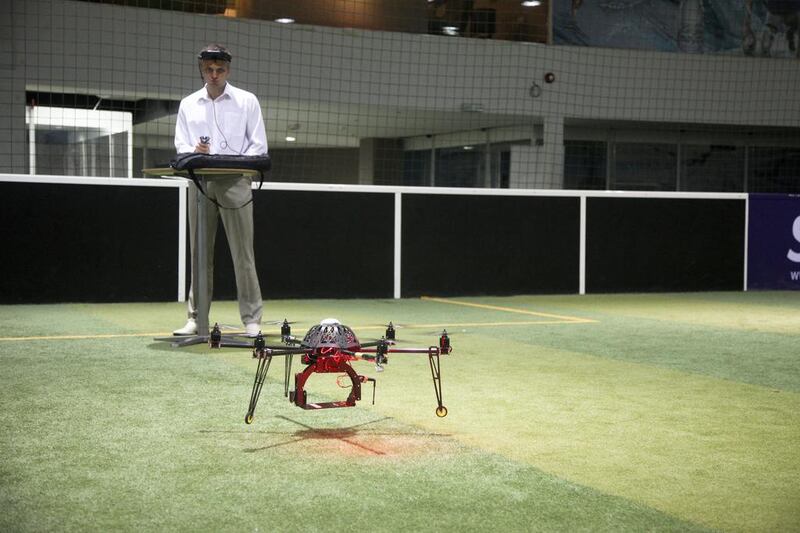Serhii Horodnii, from Brovary in Ukraine, was selected to participate in the first round of the Turn 8 accelerator programme in Dubai.
He arrived at the start of last month and until the end of this year will work on putting together a viable business plan and a pitch to investors.
All the teams in the Turn 8 accelerator get workspace, mentoring and US$24,000 to develop their ideas. Mr Horodnii’s team, Politaimo, is developing games that allows players to compete against each other using real drones.
Here’s how things are going so far.
Welcome to Dubai. You’ve been here a month. Are you enjoying it so far?
Amazing. I like the facility, I like the atmosphere, I like the environment. I like everything except maybe the heat.
How did you hear about Turn 8?
I was selected by iHub, a innovation hub for start-ups in Kiev, Ukraine then I pitched to Kamal Hassan [the chief executive of i360, which runs Turn 8]. I was then selected to participate in the Turn 8 accelerator.
What does “Politaimo” mean?
Politaimo means “Let’s fly” in Ukrainian. I am completely into aviation. I am the chief executive and at the moment I have a technical specialist, Evgen Chernow, but I am looking for additional staff. There is a lot of work to do.
Where did the idea for using real drones in games come from?
Actually I’ve been thinking about this kind of entertainment since I was 13. I am 32 now. When I was 10 or so, I used to make gliders with my father. Ukraine was part of the Soviet Union back then and most boys dreamt of becoming a cosmonaut or a pilot or a sailor. Later, drones – unmanned aerial vehicles – started to be used by the military. Much later, when movies like Surrogates and Avatar appeared and the technology became sophisticated enough I just thought: why not apply all this stuff to entertainment? To be exact, why not make a game that uses a real drone (or tank or submarine) and let users battle each others’ avatar without risk of physical injury.
So how exactly does it work?
It’s very simple. We have installed cameras, a transmitter and other sensors on our drone. It transmits video, audio and telemetry in real-time to the ground station – either a moving cabin with screens or goggles. The user controls the [vehicle] and is completely immersed into the environment. At the moment, I am just developing some simple things such as [strafing] a balloon.
Videogame graphics are pretty good. Do people really want to play on a real drone?
Subconsciously people do understand that it’s just graphics and it’s much more interesting to play in really real reality. I also did research showing that the interest in conventional online and videogaming is steadily decreasing. And vice versa, the interest in First Person Vision [advanced video technology that captures actual first-person perspective] – in entertainment – is increasing constantly.
What are your main challenges?
It’s not the technical challenges; that’s pretty easy. It’s the PR and marketing. I want to “wow” Dubai, rock Dubai with my product. I want everyone to play it and enjoy it. One reason I wanted to be in Dubai is that it’s a top tourist destination and I want this to be [associated uniquely with] Dubai.
You have been given $24,000 to develop your idea. How are you spending the money?
On buying the drone equipment.
What is your typical day like?
Wake up. Go to office. Work, work, work and again work. This includes sessions with mentors, training and looking for local business partners. Come back to the residence. Gym. Lights out.
And what kind of training do you get?
This is very interesting. It focuses on business model development, marketing. I have two backgrounds – one is Japanese language and Japanese culture; the other one is information science – but neither is in business.
How did you choose your mentor?
Actually, the mentor was interested in me. He is Dr Thanos Mitrelias at Cambridge University. Mr Kamal arranged this. I was interested in him. He said he selected us because he likes working with physical objects rather than software. We talk about once or twice a week.
You are working on other uses for the drones, I understand?
These drones can be used in a bunch of fields starting from military and ending with agriculture. I had some interest for doing some aerial footage from construction companies in Ukraine and from an advertising agency in Dubai.
lgutcher@thenational.ae





